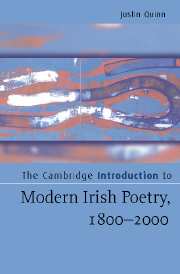Book contents
- Frontmatter
- Contents
- Acknowledgements
- Introduction
- 1 The appearance of Ireland
- 2 Tennyson's Ireland
- 3 Revival
- 4 W. B. Yeats
- 5 Wild earth
- 6 The ends of Modernism: Kinsella and Irish experiment
- 7 Ireland's Empire
- 8 Seamus Heaney
- 9 Irsko po Polsku: poetry and translation
- 10 Feminism and Irish poetry
- 11 Out of Ireland: Muldoon and other émigrés
- 12 The disappearance of Ireland
- Notes
- Guide to further reading
- Index
7 - Ireland's Empire
Published online by Cambridge University Press: 05 June 2012
- Frontmatter
- Contents
- Acknowledgements
- Introduction
- 1 The appearance of Ireland
- 2 Tennyson's Ireland
- 3 Revival
- 4 W. B. Yeats
- 5 Wild earth
- 6 The ends of Modernism: Kinsella and Irish experiment
- 7 Ireland's Empire
- 8 Seamus Heaney
- 9 Irsko po Polsku: poetry and translation
- 10 Feminism and Irish poetry
- 11 Out of Ireland: Muldoon and other émigrés
- 12 The disappearance of Ireland
- Notes
- Guide to further reading
- Index
Summary
In 1889, the British South Africa Company received its charter from Queen Victoria. Its aim was to secure control over most of south-central Africa, and its especial interest was gold and copper mining rights in the area. In order to make these resources profitable, the company had to put in place the infrastructures of the modern state, such as a police force, a banking system and a government. It was one of Britain's last significant colonial efforts, organised for the most part by Cecil Rhodes, an English-born adventurer who had risen from poverty to become one of the most important men in the British Empire. However, within three decades the Empire was falling apart, and the African states that it left in its wake were transferred from the control of white minorities to black governments by the 1960s and 1970s. It was a brief episode in the history of the continent.
One small part of that episode was played by Richard Murphy's father, Sir William Lindsay Murphy. He had spent a distinguished career in the colonial service, having been Mayor of Colombo in Sri Lanka and ending as Governor of the Bahamas. As Murphy tells us in a note to the poem ‘The God Who Eats Corn’, which is about his father's experience in Africa, when his father retired he settled in Southern Rhodesia, and with his wife and Murphy's aunts, he established a school for farm workers, in a situation where the general tendency was to keep the natives illiterate.
- Type
- Chapter
- Information
- The Cambridge Introduction to Modern Irish Poetry, 1800–2000 , pp. 113 - 129Publisher: Cambridge University PressPrint publication year: 2008



